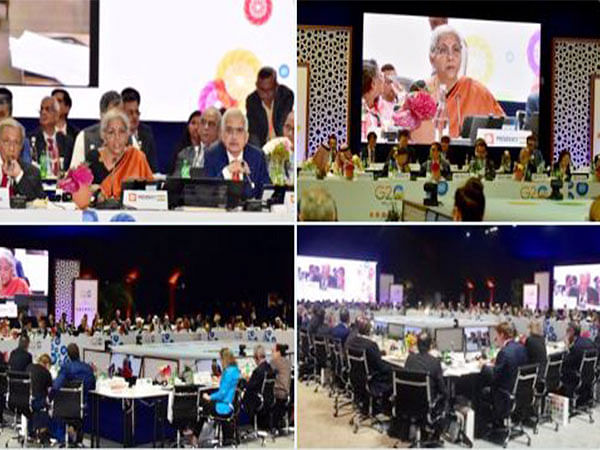Marrakesh [Morocco], October 13 (ANI): Finance Ministers and Central Bank Governors (FMCBGs) of G20 nations under India’s Presidency have adopted the roadmap for crypto regulation as was proposed by the International Monetary Fund (IMF) and Financial Stability Board (FSB) before the New Delhi Summit in September.
They met on the sidelines of IMF and World Bank annual meetings on October 12-13 in Marrakesh, Morocco.
The leaders expressing their appreciation to the IMF and FSB for effectively putting together the synthesis paper which the leaders welcomed in the G20 New Delhi Declaration.
“We adopt the Roadmap proposed in the Synthesis Paper as a G20 Roadmap on Crypto Assets,” the communique of the Fourth G20 Finance Ministers and Central Bank Governors Meeting read.
“This detailed and action-oriented roadmap is essential to achieve our common goals of macro-economic and financial stability and to ensure effective, flexible, and coordinated implementation of the comprehensive policy framework for crypto assets,” the Marrakesh communique read.
“We call for swift and coordinated implementation of the G20 Roadmap, including implementation of policy frameworks; outreach beyond G20 jurisdictions; global coordination, cooperation and information sharing; and addressing data gaps.”
They asked the IMF and FSB to provide regular and structured updates on the progress of implementation of the G20 Roadmap on crypto assets, and added they support the ongoing work and global implementation of FATF standards on cryptoassets.
Two days ahead of the G20 Summit meeting in New Delhi, the IMF and the FSB had come up with a paper on crypto, which stated a comprehensive policy and regulatory response for crypto-assets is necessary to address the risks of crypto-assets to macroeconomic and financial stability.
The paper was prepared at the request of the Indian G20 Presidency.
India’s position on crypto has been that any legislation for regulation for banning cryptocurrencies can be effective only after significant international collaboration on the evaluation of the risks and benefits.
Crypto assets are currently unregulated in India. The government does not register crypto exchanges and it maintains crypto assets, by definition, are borderless and require “international collaboration”.
Crypto assets have been in existence for more than a decade and have displayed significant volatility. Alongside their volatility, crypto-asset activities have also grown in complexity
Widespread adoption of crypto-assets could undermine the effectiveness of monetary policy, circumvent capital flow management measures, exacerbate fiscal risks, divert resources available for financing the real economy, and threaten global financial stability, it had noted. Such risks could make maintaining price stability more difficult, cause destabilising financial flows, and strain fiscal resources, the paper cautioned.
Against that backdrop, the paper suggested for a comprehensive regulatory and supervisory oversight, which it said should be a baseline to address macroeconomic and financial stability risks. The emergence of clear risks necessitates appropriate policy responses, it had added.
Endorsing the recommendations for the regulation of crypto-assets, the New Delhi Declaration adopted by the G20 leaders asserted they continue to closely monitor the risks of the fast-paced developments in the crypto ecosystem. (ANI)
This report is auto-generated from ANI news service. ThePrint holds no responsibility for its content.



